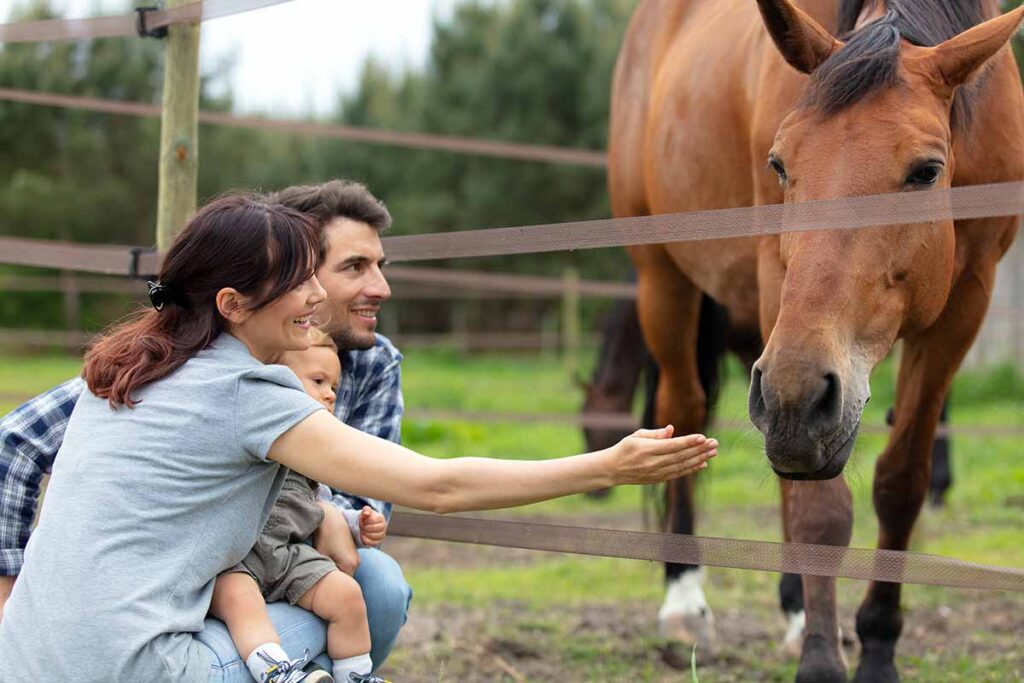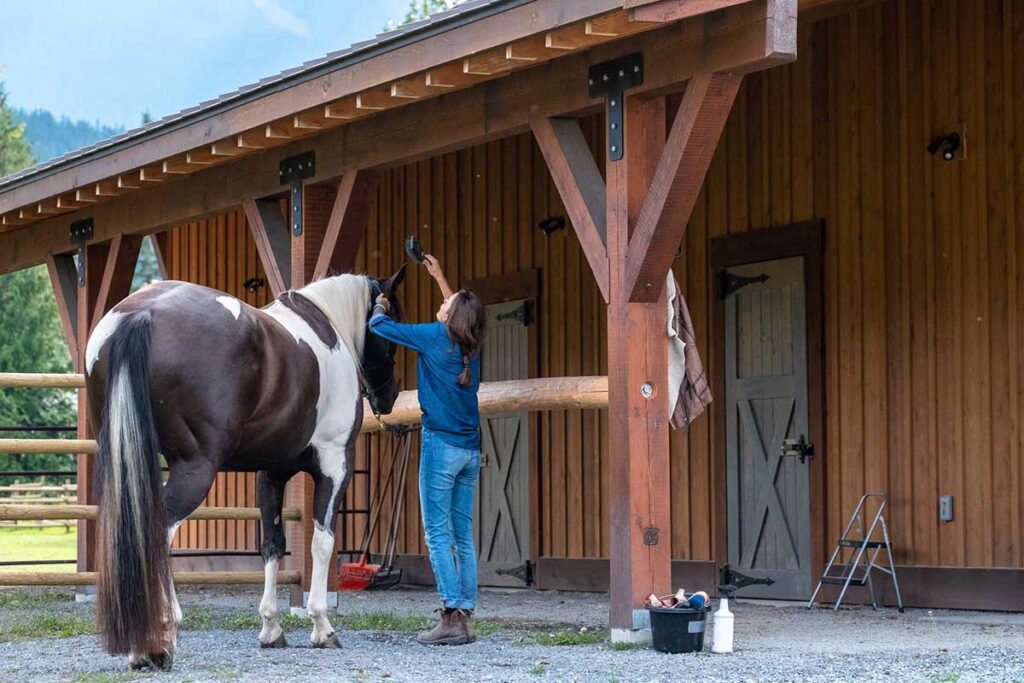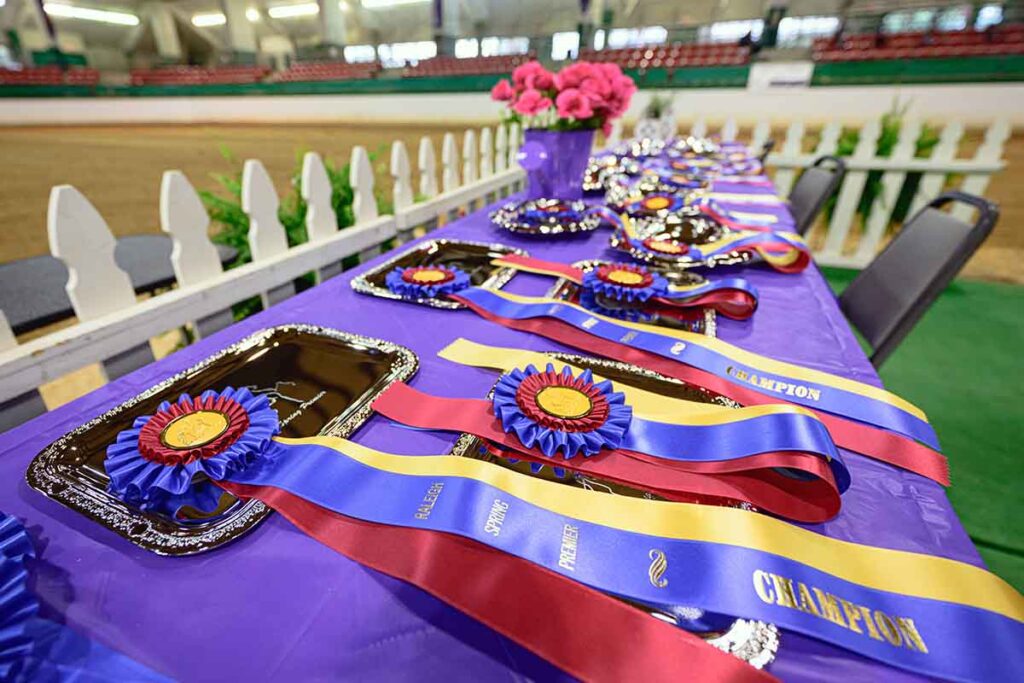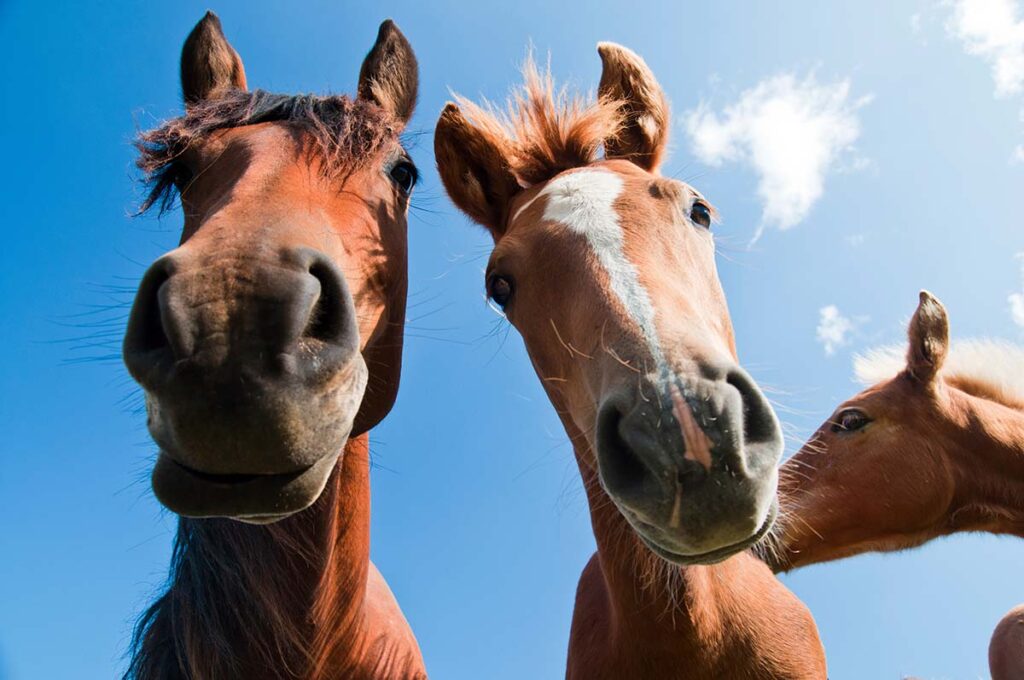Ah, the changing foliage, crisp mornings, and scent of pumpkin-spiced everything. It’s fall! This transitional season between summer and winter makes for great riding weather. It’s also a critical time to ensure your horse is in the best condition possible going into winter. By keeping up with preventive care and nutritional needs, you can set your horse up for success when the days get shorter and the temperatures drop. In this article, we’ll explore the key aspects of fall horse care and provide you with a list you can use to check off each task.
Seasonal Vaccinations
In many parts of the country, fall marks the time for annual vaccine boosters. Which ones your horse will benefit from depends on where you live and his risk level for various diseases. Here’s where you’ll want to talk to your veterinarian—he or she can recommend the vaccinations your horse needs. That being said, vets often immunize horses against the following diseases in fall:
- Equine influenza: For horses younger than 5 and those that commingle with large numbers of horses, such as at horse shows.
- Rhinopneumonitis, or equine herpesvirus: For horses that live on breeding farms or come in contact with pregnant mares; horses younger than 5; and those that commingle with large numbers of horses, such as at horse shows. Because most horses that need the equine herpesvirus vaccine also need an influenza booster, veterinarians often administer a combination flu/rhino vaccine.
- Strangles: For horses that travel and commingle with horses of unknown history.
- Botulism: For horses consuming large round hay bales, haylage, or silage as well as pregnant mares in Kentucky and the mid-Atlantic region.
These are all risk-based vaccines, meaning they protect against diseases that only threaten certain populations of horses.
Parasite Control
Fall is a crucial time to manage your horse’s internal parasites. Left unchecked, the population of worms that resides in a horse’s gut can cause weight loss, colic, and lethargy. At the beginning of fall, have your veterinarian perform fecal egg counts on a sample of your horse’s manure to determine his parasite load and administer the most effective deworming products.
Dental Care
If your horse hasn’t yet had his annual dental exam, fall is a perfect time to schedule it. A thorough dental exam from a veterinarian can ensure your horse’s teeth are wearing evenly and identify and correct dental issues early. Healthy, pain-free teeth allow a horse to chew properly. This is important for getting the most nutrients from feed and maintaining weight over winter.
Regular dental care is particularly important if your horse is in his golden years. Senior horses (those in their late teens and beyond) are more prone to dental issues—and, hence, chewing issues—as their teeth wear down.
Disease Prevention

Some diseases are more prevalent than others in the fall, so it makes sense to be proactive about preventing them. Seasonal health concerns include:
- Seasonal pasture myopathy (SPM): Horses can develop this muscle disease when they eat toxic leaves and seedpods from certain tree species, such as the boxelder or maple. Horses are most at risk in the fall, when these trees drop their leaves and seeds. If your horse’s pasture has any of these tree species, keep the branches trimmed and provide plenty of hay so he’s not tempted to forage for food.
- Laminitis: In the fall, the sugar levels in grass rise as the temps drop. When horses graze high-sugar grasses, they can experience insulin spikes that can trigger the extremely painful hoof disease laminitis. Horses that are particularly at risk are those that are obese or overweight or have insulin issues or endocrine disease (such as pituitary pars intermedia dysfunction or equine metabolic syndrome).
- Potomac horse fever: Horses in the northeastern United States can get Potomac horse fever by ingesting infected insects in and around water sources. It’s more commonly seen in late summer and fall, when the insect populations are highest. Affected horses can spike a fever, get diarrhea, and even develop laminitis.
- Colic: Horses can colic (have digestive issues and abdominal pain) in fall when we make management changes such as riding less and keeping them in their stalls more. This is most likely to be a concern in late fall, as temps really start to drop and the grass dries up. The increase in dry hay consumption (particularly if your horse isn’t drinking enough) can slow the digestive system down considerably.
Take your horse’s vital signs (such as his temperature) regularly so you can pick up on a brewing illness right away.
Body Condition and Nutrition

Fall is prime time to assess your horse’s body condition and adjust his feeding regimen if needed. If he’s a bit chubby, for instance, and you don’t plan to ride as much come winter, you might need to reduce his calorie intake. Senior horses and those on the lean side will need increased calories to build up their body condition in preparation for winter. This is because horses expend more energy when they’re trying to stay warm and will need extra calories to stay in good body condition. Ideally, aim to have your horse at a 5 or 6 on the Henneke body condition scale to keep him in good weight through winter. You can safely increase calorie intake by:
- Providing good-quality forage with high fiber content.
- Replacing some of your horse’s grass hay with higher-calorie alfalfa.
- Offering your horse fiber-rich beet pulp, which is an excellent way to deliver calories without the added sugar or starch.
- Supplementing with an energy source such as rice bran.
Stock up with your winter supply of quality hay and source any alternative feeds, such as beet pulp, oil, or concentrate feed, you might need in fall. Adjust forage and grain intake (gradually!) to meet your horse’s changing nutritional needs. Here’s where an equine nutritionist or feed company representative can provide a wealth of information.
And, of course, make sure your horse gets plenty of access to water so he stays hydrated. Lack of water intake in the fall can put him at risk of colic.
Housing Considerations
Your horse’s housing situation might change in autumn. Maybe he spends less time turned out on pasture as the days get shorter. If your horse currently gets turned out 24/7 or nights only (a practice some barn operators adopt during the heat of summer), consider switching him to daytime turnout. Buy your horse a properly fitted turnout rug, sheet, and/or blanket if your region experiences harsh winters. This is particularly important if you plan to body-clip your horse’s natural winter coat. If you already own blankets, make sure they’re clean and in good condition before you need them!
Take-Home Message
Your horse needs specific care during the fall season to keep him healthy through winter. Preventive measures such as vaccinations, parasite control, dental exams, and diet assessments will help him avoid any issues. Tick off all the boxes on this fall horse care checklist so you can enjoy autumn with your equine companion!
Are you enjoying this content? Sign up for My New Horse’s FREE newsletter to get the latest horse owner info and fun facts delivered straight to your inbox!








